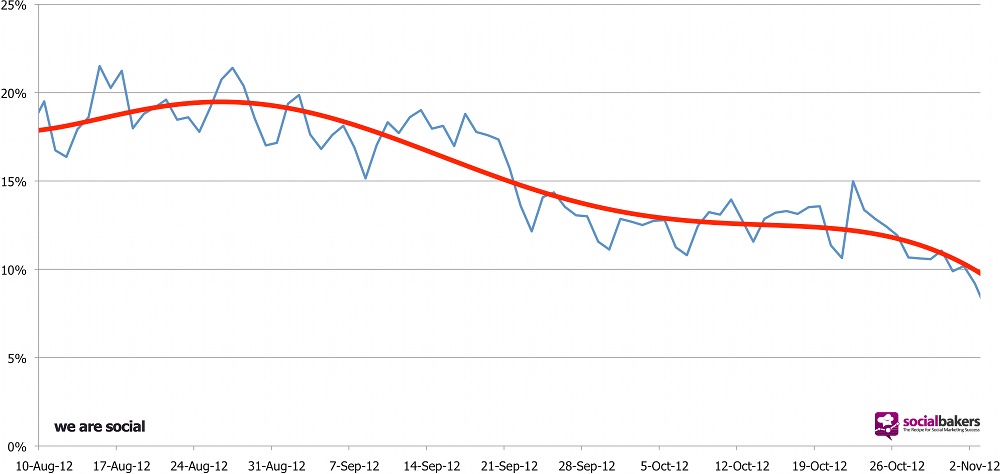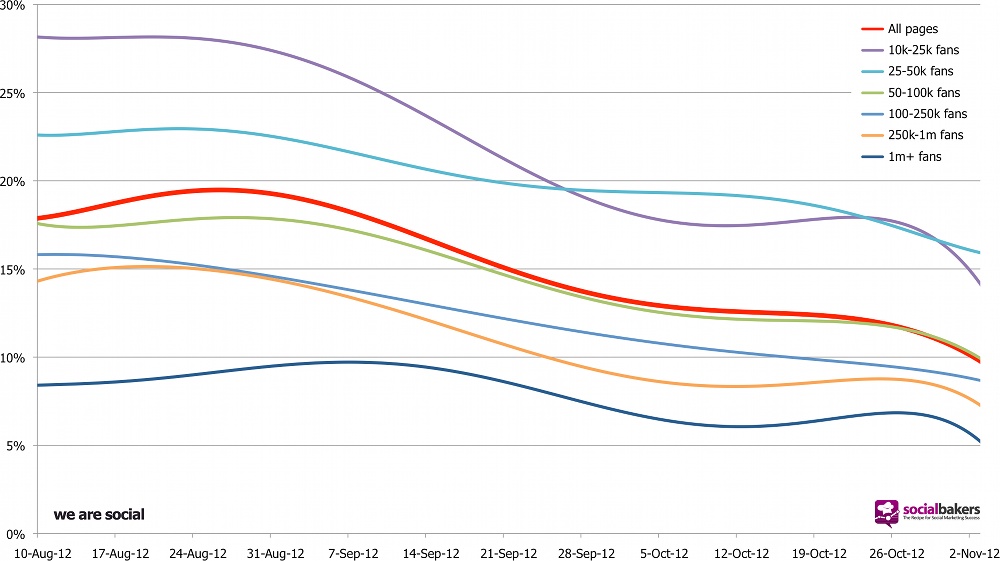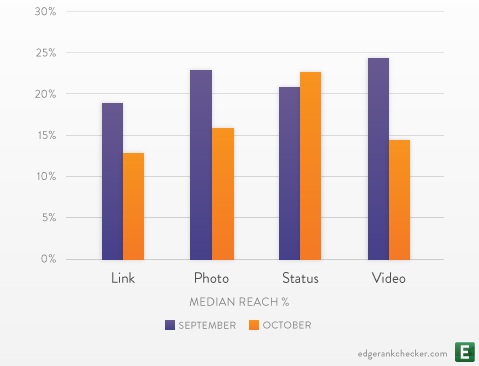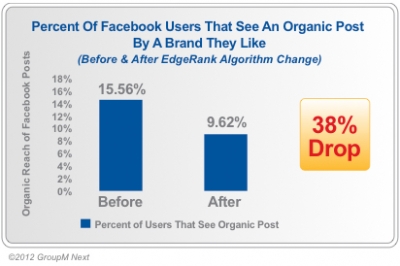Yes, Facebook has decreased page reach
TechCrunch recently carried the following article from me, commenting on the ongoing decline in the reach of Facebook pages. They’ve been kind enough to let us reproduce it in full below:
Josh Constine wrote an insightful post last week, debunking the myth that Facebook has decreased page post reach to increase the sales of promoted posts. However, just because that wasn’t the reason, that doesn’t mean that Facebook hasn’t reduced page reach.
Since the end of August there has been a precipitous drop in reach across pages of all sizes. There have been first hand reports of Facebook telling agencies who manage large numbers of pages for clients that they were going to experience a large drop in reach, and data clearly showing this drop from at least three independent sources – Facebook page analytics provider EdgeRank Checker, the head of social measurement at WPP’s Team Detroit and a study conducted by us here at We Are Social in conjunction with Socialbakers.
So We Are Social and Socialbakers went back to the data to see what has happened in the month since our first report, and whether a larger sample of data would lead to the same conclusions.
Data shows an average 40% drop in reach

Average post organic reach 10th Aug – 2nd Nov, based on 41,051 posts made by 274 sample pages in the period.
As you can see from the graph above, the average post’s organic reach has clearly dropped by over 40% since the end of August, and is showing no signs of levelling off.
Of course, how any one individual page has been affected will vary, and it’s long been known that the more fans a page has, the less reach and engagement it will get as a proportion of its audience, but the drop in reach seems to have affected pages of all sizes fairly equally:

Average post organic reach 10th Aug – 2nd Nov, broken down by page size, based on 41,051 posts made by 274 sample pages in the period.
Interestingly, EdgeRank Checker has just released some follow-up research also showing a big drop in reach from September to October, drilling down into the average reach of different post types:

Their research is showing that plain status update posts don’t seem to be effected by the reach drop to the same extent as photo, video or link updates, but it may be too early to draw any firm conclusions on this.
Engagement stays constant
And as we found before, despite the drop in reach, the average page post engagement rate has stayed fairly steady during the period:

Average post engagement rate 10th Aug – 2nd Nov, based on 41,051 posts made by 274 sample pages in the period.
For the average post reach to drop while the average engagement rate stays steady, this must mean that the posts that are getting seen by fans are now getting more engagement.
What does this mean?
We’ve used hard data to show there has been a drop in Facebook page reach since the end of August. And this drop has been ongoing for over two months – it’s not going away.
It’s clear that Facebook have changed their EdgeRank algorithm to reduce the amount of brands’ Facebook page posts seen in fans’ newsfeeds, but what does this mean?
Well, while some may say this is a deliberate move by Facebook to force page owners to pay for reach using promoted posts, others could reasonably say this is a sensible adjustment to compensate for the growing number of pages that its users are fans of, and the increased number of posts coming from those pages.
But overall, you shouldn’t be too worried. Posts never reached 100% of a pages fan base anyway, with EdgeRank always having determined the posts that pages fans would and wouldn’t see.
What can you do about it?
Pages are competing for a much smaller ‘share of newsfeed’, so optimizing your posts for engagement now more important than ever. Josh gives some good advice on this in his post:
Focus on publishing high-quality content. Don’t post too often and don’t cram your marketing down people’s throats. Be entertaining and informative. Then follow your analytics closely, consider hiring experts that can help, and refine your strategy.
And, as much as you don’t want to hear this, you’re also going to have to start spending money to promote your posts. Remember that more engaging posts perform better and spend your money wisely.
And Facebook’s position on this?
As to Facebook’s comments in Josh’ post:
Just to put an official nail in the coffin of this rumor, I asked news feed manager Cathcart straight-up: “Did Facebook decrease organic Page reach to boost sales of Promoted Posts?” His flat-out answer was “NO.” Cathcart says that for Pages, “the median reach is still above 16 percent as of a month ago” just like it was in February.
Well, you’ll note that Facebook’s representative is saying that Facebook didn’t decrease reach to boost sales of promoted posts, not that they didn’t decrease reach. And as our data shows, the median reach may have been above 16% a month ago, but it’s not today.
When I asked Facebook whether I’d misinterpreted their representative’s comments and if there had indeed been a decrease in reach, they dodged the question by saying:
We’re constantly improving the way stories are shown in newsfeed. With the growing number of pages on Facebook it is important that people see content that is most relevant to them. These findings show that engagement with newsfeed posts has actually increased. At the same time, the number of posts being dismissed as uninteresting or spam has fallen. That’s a great result for page owners and an improved experience for all of us who use Facebook.
I leave you to draw your own conclusions…
Update: TechCrunch have now published a follow-up story, with a vehement denial from Facebook:
Analytics providers are only looking at a relatively small number of Pages, typically fewer than 1,000. Facebook’s product marketing director for ads Matt Idema tells me that what those studies show “all depends on what set of pages you’re looking at and how many pages you’re looking at. We’re looking at all the Pages. The median reach did not decrease.”
While Ad Age have just published data from Group M, showing a 38% drop in reach across 25 brands’ Facebook pages:
